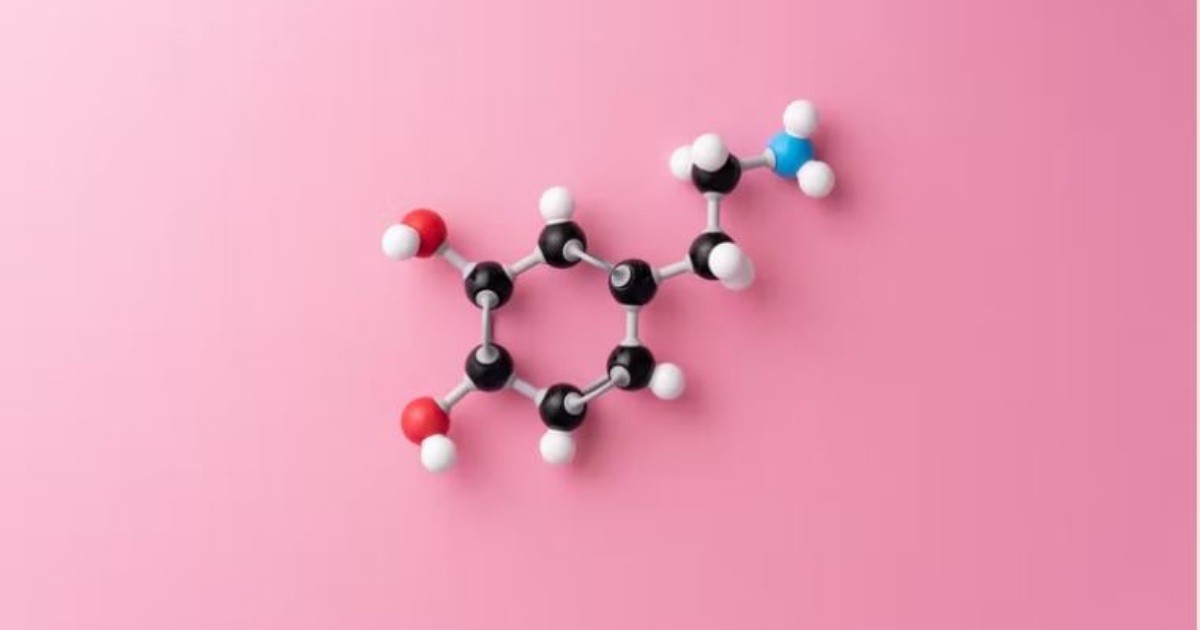Dopamine chemical formula.
Shutterstock / bogdandimages
Jose A. Morales Garcia, Complutense University of Madrid
Dopamine is a neurotransmitter, that is, a molecule that is responsible for carrying a message from the neurons that produce it to other cells. That is why it intervenes in a large number of processes such as movement control, memory, brain reward – that mechanism of our brain that reinforces us to repeat a behavior – or learning.
It also influences numerous functions outside the brain, such as gastrointestinal motility, hormone release, blood pressure, and even the activity of immune system cells.
“He who sings his evil frightens”, says the saying. But it’s not the same for Rosalía to sing to her “Si me das me aeleccion” as for her three-year-old son to yell to the sound of “Baby shark”. It is also not the same to sing “Paquito el chocolatero” at the town’s patron saint festivities, than to do it in the middle of a funeral, an exam or inside an airplane. This precisely explains the disparity of functions that dopamine has. And it is that its action depends on where, when, how and in what quantity it is produced.
Store memories through emotions
Dopamine is known worldwide for being one of the molecules of happiness. Not in vain, It is one of the tools that Cupid uses to fall in love.
It also provides pleasure and relaxation. It intervenes in memory and learning processes because it regulates the duration of memories. In other words, it decides whether certain information can be stored for a period of time or is deleted immediately.
And this is achieved by encouraging memory and learning to be associated with emotions. Dopamine intervenes in this process in the accumbens – a part of the brain highly involved in the control of emotions, which communicates with areas responsible for memory, such as the hippocampus.
Therefore, learning that contains an emotional charge lasts longer, because learning causes pleasure and information is retained for longer. So that of “the letter, with blood enters” is of no use.
The amount of dopamine in the brain gives information about your personality
Our horoscope does not influence or determine our personality at all. Dopamine, however, yes. And it is that numerous scientific studies maintain that dopamine could be related to personality traits such as insecurity, cowardice or even the degree of extroversion.
So much so that the amount of dopamine in the cerebral amygdala – a region of the brain related to emotions such as anger, pleasure or fear – would allow us to know if a person is calm or insecure or if they get stressed easily.
This is what happens with people with a predilection for “strong emotions”. Certain regions of your brain they have a higher amount of dopamine, so they are more “unconscious” in their actions. On the contrary, low levels of dopamine have been linked to social phobia.
Dopamine, addictions and motivation
Dopamine is to blame for our addictions, the bad ones and the less bad ones. Among the bad ones, drugs increase the amount of dopamine in the brain’s reward system, which produces a state of pleasure that reinforces that we continue consuming them. Something similar happens with the least bad, such as candy or junk food.
In addition, each person does not respond in the same way to these addictions. The reason is that not everyone feels the same pleasure when eating a cake, for example. An scientific study ensures that it is due to the number of receptors to which dopamine binds.
In this way, people with a tendency to obesity would have fewer of these receptors and therefore would need to eat more to notice the same satisfaction that the act of eating produces. They are therefore “more addicted” to food. And this is another characteristic of dopamine: its release can make us addicted since it drives us to a continuous search for pleasure.
Dopamine also has a motivational function. Not only does it reward us when we perform a pleasurable activity, but it is also released long before we perform an action. In this way, it manages to motivate us to look for pleasant situations or activities, avoiding negative ones.
Proof of this is that the low production of dopamine causes anhedonia, one of the most characteristic symptoms of depression. On the contrary, high levels of dopamine in the prefrontal cortex make people more motivated to meet more demanding goals.
The dark side of dopamine
But not everything is joy. Dopamine is also linked to many psychiatric and neurological diseases.
When we have an excess of dopamine, disorders can appear such as schizophrenia or bipolar disorder.
In case the amount of dopamine decreases, the major depressive disorder, attention deficit hyperactivity disorderthe Huntington’s disease and the HIV-1 associated neurodegeneration.
Although if there is a disease that inevitably comes to mind when we talk about a dopamine deficiency, it is Parkinson’s disease, whose World Day is celebrated on April 11. In this case, the cause of this disorder is the death of neurons that produce dopamine in a region of the brain called the substantia nigra. This dopamine is involved in the control of motor activity, hence the symptoms presented by patients who suffer from it.
Although there is currently no cure for Parkinson’s, some treatments improve symptoms and, therefore, the quality of life of patients.
In this sense, the star drug for decades has been levodopa, the metabolic precursor of dopamine. That is, when consumed orally, it is rapidly absorbed in the intestine and quickly reaches the brain, where it is transformed into dopamine, improving control of movement.
In short, dopamine is the Mary Poppins of our body, “virtually perfect in every way.” As for her actions, just like the English nanny, she can be stern but also kind and polite.
![]()
Jose A. Morales GarciaProfessor and Research Scientist in Neuroscience, Complutense University of Madrid
This article was originally published on The Conversation. read the original.

















